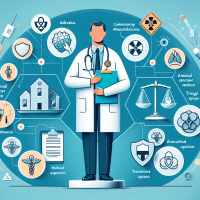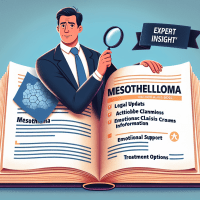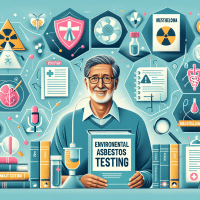Navigating Mesothelioma: A Compassionate Journey of Hope, Resilience, and Informed Care
By a dedicated oncology educator and patient advocate with years of firsthand experience, this narrative aims to offer empathy, clarity, and practical guidance for those facing the complexities of mesothelioma.

Introduction: A Heartfelt Journey
My journey with mesothelioma education began when I witnessed the profound effects of this disease on patients and their families. As an oncology educator, I have spent countless hours with individuals facing the harsh realities of this condition. I share these experiences to provide you with not only factual, medically accurate information but also to create a space for emotional healing and realistic hope.
In this post, I invite you to walk with me through the labyrinth of diagnosis, treatment, coping mechanisms, support networks, and next steps. I consider this a dialogue—a conversation between someone who has seen the struggles and victories of mesothelioma and those who are currently navigating this terrain.
Understanding Diagnosis and Staging
The moment a mesothelioma diagnosis is announced, life changes. I remember assisting a patient who sat quietly as I explained that mesothelioma staging informs treatment decisions. The initial shock is compounded by uncertainty, but let me reassure you: understanding each stage—from Stage I to Stage IV—empowers you to ask informed questions and advocate effectively.
It is crucial to work with an experienced medical team that understands the subtleties of mesothelioma staging. My interactions with oncologists, radiologists, and thoracic surgeons have consistently reinforced that early and accurate diagnosis is the cornerstone of effective treatment planning.
I recall sitting with a patient newly diagnosed with Stage II mesothelioma, whose tearful gratitude for clear explanations still motivates me today. It is conversations like these that remind us every single narrative truly matters, and every clarification lights the way through the darkest hours.
Treatment Options Explored
As we examine treatment, I wish to emphasize that mesothelioma care is multifaceted. Options include surgery, chemotherapy, radiation therapy, and in some cases, emerging immunotherapy techniques. My role as an educator has always been to break down these options in a language that respects both the science and the human experience behind them.
Discussing treatment was never just about clinical decisions—it is equally about managing side effects, emotional trauma, and the complex interplay between hope and fear. I always encourage patients and their families to ask about clinical trials and seek second opinions when needed. This open dialogue with your care team can be immensely empowering.
‘Every step, no matter how small, is a journey toward healing.’ A phrase shared by a fellow patient during one of the hardest treatment days continues to inspire me to advocate with courage, empathy, and transparency.
For a better visual representation, consider a flowchart titled ‘Mesothelioma Treatment Pathways’ that maps out these options and highlights potential side effects and subsequent support measures.
This is where a detailed table comparing treatment side effects can also be of service to those striving for clarity in decision making.
Coping Strategies for Patients and Families
The emotional toll of mesothelioma can be as challenging as its physical manifestations. I have seen individuals grapple with grief, anxiety, and feelings of isolation. It is natural to feel overwhelmed when faced with changes in family dynamics or the realities of treatment side effects.
In my years of experience, I have learned that coping strategies take on many forms. Mindfulness and meditation, professional counseling, and joining support groups are powerful tools—each offering avenues for healing. I encourage you to reach out, share your story, and connect with others who understand the weight of this journey.
From deep, reflective journaling to communal support meetings, every coping mechanism can play a vital role. I have personally attended grief support sessions that not only bolstered my strength but also enriched my capacity to support others.
At one point, after a particularly arduous day filled with uncertainty, I sat quietly with a cup of tea and penned my thoughts. It was in these moments of vulnerable honesty that I rediscovered my inner resilience. I share this with you, hoping that you too can find solace in acknowledging your emotions.
Building a Support Network
One of the most instrumental aspects of managing mesothelioma is having a solid support network. I cannot stress enough how important it is for patients, caregivers, and families to align with a community that understands the multifaceted challenges posed by this disease.
In the years since I began my advocacy work, I have collaborated with numerous charities, legal advisors, and financial counseling services. These resources are available as secondary options and should be presented with complete transparency, ensuring that holistic care remains the priority while commercial and legal aids are clearly demarcated as additional supports.
For instance, while navigating treatment, a patient may benefit from counseling services alongside discussions about workers’ compensation or legal claims related to asbestos exposure. I always recommend consulting with experts who can provide balanced, ethical guidance in these areas without compromising on the human element of care.
The power of a community is further enhanced when you have access to reliable information. I remind my fellow patients to use internal resources and recommended articles like Mesothelioma Symptom Management and Finding Emotional Support Communities for ongoing support and practical advice.
Next Steps: Embracing a Hopeful Future
Looking ahead, hope is the enduring flame that sustains us. While mesothelioma is a challenging journey, it is also an opportunity to forge new paths in self-advocacy and community strength. As you chart your next steps, remember that each decision—whether seeking a second opinion, exploring a new treatment modality, or simply taking time to rest and reflect—matters immensely.
For those who feel adrift in this sea of uncertainty, it is important to remember that there are layers of support available. From high-quality medical care to supportive counseling and legal advice, every resource is designed to ease the burden of decision-making and promote a balanced approach to overall well-being.
My experience has taught me that mesothelioma is not just a medical diagnosis—it is a life-altering journey. Sharing stories, offering clarity, and standing together in solidarity are steps toward healing. I commit to continuing this dialogue, providing balanced and empathetic education that empowers all who are touched by this disease.






